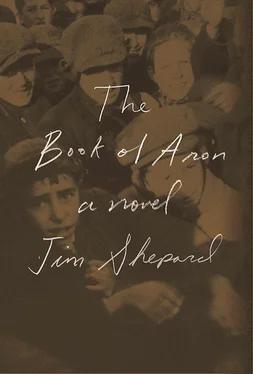EVEN ADINA THOUGHT THE OLD DOCTOR HAD BEEN worthwhile, even if part of the reason for that had been the cookies afterwards. Later she said she hadn’t seen cookies in she didn’t know how long and Boris got angry that we hadn’t swiped some for him and Lutek. When Zofia told him they weren’t really cookies, Adina said maybe they weren’t cookies but they’d been close enough.
We were all hungry all the time. “I remember Mama fed us vegetables because she thought they were healthy,” Adina told us one morning, like she’d had a dream. We were in front of a shop for hernia belts and someone was shouting at their kids from the building’s roof. Someone behind us on the first floor kept telling his wife to add water to the carbide lamp. Someone else poured dirty oil from a windowsill higher up and it spattered on the sidewalk near our feet.
Boris got us started trading the ration cards of people who’d died or left the ghetto, and he thought the best place was around the distribution shops when the mothers came by with their small children, and he was right. He and Lutek did the haggling because the rest of us couldn’t stand to see the kids’ faces while it went on. Lutek had gotten one boy’s wooden shoes by holding the ration cards under his mother’s nose and saying he was only asking her to throw in one extra item, and that if she wanted to trade she had to be able to imagine herself in another guy’s shoes. She’d taken the cards and used them for rutabagas and her son had gone home barefoot. But it was getting warmer. Zofia said it was already late in May though Boris thought it was still April. Lutek tried on the wooden shoes and said that just as he thought, they fit perfectly.
“What is he contributing?” Boris said to Lutek, meaning me. But the girls told him to leave me alone.
“My sister hated spinach,” Adina said. “But I liked it.”
“Are you still talking about that?” Boris wanted to know.
“My mother used to tell me I had to be so clean that my knees would shine,” Zofia said.
I could see the lice where her hair was parted. “You’re still pretty clean,” I told her.
Lutek told us their apartment was now cleaner because his father and some of the other porters had taken to using sawdust ovens, which were also cheaper than coal.
“Do those keep you warm?” Adina asked.
“Nothing keeps you warm,” he told her.
“The ovens aren’t the problem,” Boris said. “Hello, Mother,” he said to a woman who came out of the shop with three small children, all of them weeping. “Is there any way I can be of help?”
After they left he held up a heavy shawl. “It’s English,” he said, showing us the label. He and Lutek went back and forth over whether he might have given the mother less.
We said goodbye an hour before curfew and I was halfway home when someone grabbed my collar. “I like my bootjack,” Lejkin said.
“I’m glad to hear it,” I told him, pulling free. “I have to get home.”
“You always have to get home,” Lejkin said, as though this was some ongoing mystery.
He walked along beside me, eating something that he didn’t offer to share.
“My friends on Krochmalna Street want to keep better track of who’s doing what at the different gates,” he said. He meant the yellow police, who had moved their headquarters there in January. I knew because Lutek now took a different route through the small ghetto.
“What’s that to me?” I asked.
“You seem to be all over the place,” he said. “I just thought you might notice things.”
“I’m bad at noticing things,” I told him.
“Well, whatever you do notice,” he said.
I kept walking. I stopped at the trolley stop but no one was waiting there. I’d probably missed it.
“It’s just a matter of keeping track of things,” he said. “It’s not as though anyone intends to do anything that’s bad for business.”
I waited for a few minutes more and then started walking again. The top of one shoe had come completely loose and flapped with every step.
“There are also opportunities I could let you know about when they arise,” he said. “There are some confiscated onions right now, for example, that haven’t yet been turned in.”
“I think you’re the one who’s all over the place,” I told him.
He shrugged like he was used to those kinds of compliments. “The Jewish Order Service, by the way, also has the responsibility of deciding which apartments to requisition, in terms of the further resettlement of the incoming population,” he said.
“Well, our apartment’s already packed,” I said.
“Oh, some apartments are fifteen and twenty to a room,” he told me. “You can’t imagine.”
I stopped and tried to rewrap the cloth strips around my shoe. I couldn’t believe I was crying about a shoe.
“And of course there’s always the question of what your friends might do once they hear you’re working with the Service,” he said. And when I didn’t answer that either he said, “Or have you already told them?
“Well, think about it,” he said a block or two later, when I still hadn’t spoken. And when I looked back again after another half a block he was gone.
THERE WAS A COMMOTION BY MY BUILDING. A GROUP of Germans were kicking at something between them and screaming in German at whatever they were kicking. I hadn’t heard men screaming like that before. People stopped on the street to watch. I didn’t want to get too close but they were in front of my door.
It was someone on his side on the cobblestones and when he made a noise like he was in pain I knew it was my father. I stopped and then pushed closer like someone in line for the trolley. After a few more kicks the Germans stayed in a circle around him but talked with each other instead of screaming. While they inspected him he crawled around their legs. He saw me but didn’t make any sign. The feeling that I should do something lifted me onto my toes. I wanted to but when the time came to do it I lost my nerve. I stood there in the middle of the street.
He had his knees up and his shoulders hunched and a German gave him one more kick that spun him around. Then he just lay there. I thought a son would go to him or scream at the Germans himself. They exchanged a few more comments with some curious Germans on the other side of the street. Then they all started shoving and haranguing one another and left.
A few people approached him, including me. The sleeves and back of his coat were soaked in mud. “Don’t,” he said when I reached to help him up. He got onto his hands and knees and then his feet, tipping around a little, and then headed off away from our door.
I followed him. His walk got more like his old walk. At the first corner we came to, he turned and I caught up with him. Every so often I looked up at his face. He turned again at the next corner, and then again. When the fourth turn brought us back to our block, he stopped to make sure the Germans were gone. At our door he had me go up the front steps ahead of him.
My mother asked what had happened and he told her he’d been knocked down by a wagon. She got upset and boiled some water to help him clean himself up and said he could’ve been killed. He told her to sew some patches on my coat’s elbows, and that everything was sticking out on me. He washed his face at the sink for a long time. My mother was also upset about his coat, which was not only muddy but also had lost one of its pockets. She moaned and carried on about the lining and finally my father shouted at her to stop going on and on about the coat , and she was scared and hurt enough that she didn’t say anything else.
Boris’s father poked his head in to ask if everything was okay. When no one answered, Boris called from the hallway, “He got hit by a wagon.” My father went back to washing his face.
Читать дальше












